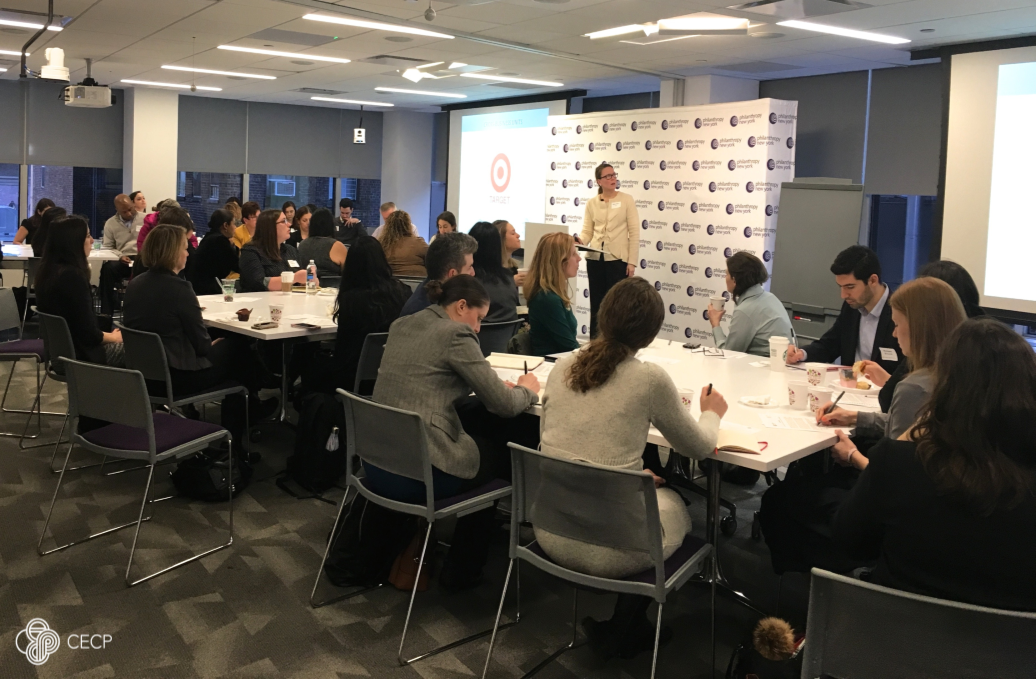CECP’s nationwide programming brings senior corporate citizenship professionals together to build community and learn from each other and experts from across the social impact space. These in-person and virtual meetings connect corporate leaders to the latest research, case studies, and with like-minded peers to advance their companies’ social impact priorities.
Hosted in partnership with Philanthropy New York, Service for Impact convenes corporate grantmakers and volunteer leaders to explore ways to create an impact in the community and support business objectives through volunteerism. Launched in the spring of 2009, Service for Impact was formed in response to President Barack Obama’s call for Americans to integrate volunteering and community service into their lives. Funders in New York established a community that hoped to expand volunteerism and improve lives throughout the New York City metro area.
Jennifer Weston-Murphy of CECP’s Corporate Leadership Team sat down with Service for Impact Co-Chairs Matthew Nelson, Corporate Vice President, New York Life and Lalita Badinehal, Director of Grantmaking, Credit Suisse Americas Foundation talk about what Service for Impact aims to accomplish and how the employee engagement field has evolved in recent years.
Jennifer Weston-Murphy: What makes Service for Impact unique?
Matthew Nelson: Service for Impact is unique in so many ways. It brings together corporate citizenship leaders to discuss ways to create powerful volunteering programs. In our individual companies where there are very few people focused on this work, we can’t walk down the hall and ask a colleague about volunteer strategies. We are it. Service for Impact serves a unique role as a community for peers in this space to learn from each other, as well as to connect to the latest trends and best practices in the field.
Lalita Badinehal: What I appreciate so much is how committed the community is to going beyond the tactical aspects of implementing an effective volunteering program. An important part of our conversations is focused on what must change to evolve the perception of corporate volunteering from a “nice to have” to a “need to have,” and eventually to a transformational resource to companies. For example, rather than companies engaging in pay-to-play volunteering, Service for Impact encourages dialogue on how volunteering can be a strategic piece of an overall corporate citizenship strategy to maximize its impact in both the community and in the corporation.
JWM: How has corporate volunteerism evolved? What sets apart the best volunteering programs?
LB: Looking back at the last 10 years, it certainly seems like corporate volunteering has become a more important and visible piece of a company’s multi-faceted approach to engaging with their communities. More companies have embraced and supported it, and today, most employees expect a company to offer some sort of volunteering program. The focus on skills-based volunteering continues to grow in its many forms including pro bono, nonprofit board service, virtual volunteering, “micro-volunteering,” and immersive skills-based volunteering assignments outside the employees’ home base.
Volunteering programs at companies can be quite different, so it’s hard to evaluate them, but the best ones: (1) meet both a societal and business need in an authentic manner and (2) have a way of measuring and articulating the social and business impact clearly to ensure they have resourcing to continue running these programs. Let’s take nonprofit board service as an example. Not only does an effective nonprofit board service program enable employees to contribute their professional expertise, but it also gives them the chance to use their leadership skills in new ways—and even acquire a new set of tools that they can bring back to the office. You can quantify the business and social impact of nonprofit board service in several ways: measure the leadership development as well as the retention and engagement rate of employees who serve; and assess the impact on the nonprofit’s resource base and its ability to meet its goals.
MN: Much like the changes we’ve seen in corporate giving, which has evolved from simply writing checks to partnering more strategically with nonprofits and investing in issues that align with the business, corporate volunteering has changed in meaningful ways. It has moved away from one-time, transactional activities to longer-term, strategic nonprofit partnerships that bring value to the nonprofit, to the company, and to society. As an exciting development in the field, companies are also integrating volunteering into business plans to enhance teams and as part of their change management strategies! Emerging markets often start with volunteering that helps the business understand the needs and creates products and services that are of value to the community and provide a social good. Indeed, the creation of benefit corporations (B Corps) reflects how social good, volunteering, and business come together as entities that are positive forces in society.
JWM: How have executives started to see the value of corporate volunteering and employee engagement?
LB: Recruiting, retaining, and developing talent is a key motivation for most executives in the c-suite given today’s war for talent. And corporate volunteering is ultimately a way to connect an individual’s passion and purpose to make a meaningful impact in society with the company’s mission and values. Executives are also increasingly connecting the dots—and understand that for these programs to be effective, they must be authentic and embedded in the business strategy, and not simply serve as an add-on.
MN: Agreed. Today’s job seekers look at how a company is affecting the communities it works in. For example, data analyst scientists are a hot commodity. Giving them the opportunity to use their highly valued skills with a nonprofit provides these employees a way to give back that is unique and underscores a company’s values. Volunteers, especially skills-based volunteers, are highly engaged employees.
JWM: Name a peer who you admire.
MN: There are so many people in this space who have helped change it for the better. Gail Gershon, a citizenship leader at Gap, was the founding corporate chair of Service for Impact and helped oversee it for nearly a decade. Her efforts to convene cross-sector partners to elevate volunteering as a critical tool to transform our communities and our businesses have had a lasting impact that the field continues to feel to this day.
LB: I admire IBM’s Corporate Service Corps program. I think it’s one the most thoughtful skills-based immersion programs, and I applaud my fellow colleagues at IBM who conceived of it and do the daily work to execute the program. What’s more, Service Corps has been around for more than 10 years! It’s a great example of a program with a triple-win strategy that benefits IBM employees, its communities, and the business. In this way, their programs are more sustainable and deeply integrated into the company’s strategy.
Participation in Service for Impact is open to CECP-affiliated companies and Philanthropy New York members. The next event will be held April 9th, 2019. Register here.
About Service for Impact’s Co-Chairs
Matthew Nelson is a Corporate Vice President at New York Life and oversees all workforce engagement programs including the giving campaign, matching gifts, volunteer grants and programs. He also provides strategy support for communications for the New York Life Foundation and Corporate Responsibility Department. Matthew has served in similar roles with American Express and Ameriprise Financial. Most recently he was Vice President of Member Services and Membership at the Council on Foundations, the trade association for foundations in the United States. He is on the advisory committee for Charities@Work, serves as co-chair of the Service for Impact group for Philanthropy New York and CECP, and has spoken on corporate social responsibility across the country and around the world.
Lalita Badinehal oversees Credit Suisse’s grantmaking in the Americas region spanning the company’s education and engagement focus areas. She has also led Credit Suisse’s Community Engagement programs, inspiring employees to actualize their passion, purpose, and skill set to make a deep and sustained impact in the community through a variety of ways including through service as nonprofit board members. Lalita has a strong track record of partnering with diverse stakeholders to build corporate citizenship initiatives that attract, develop, engage employees and enhance corporate culture. During her career, she has also managed Institutional Business Development at Acumen, consulted for several nonprofit organizations and foundations in New York and Mumbai and worked in corporate and investment banking at Credit Suisse and Goldman Sachs. She enjoys contributing to thought leadership in the sector by speaking and writing on a variety of topics and serving as co-chair of the Service for Impact Group for Philanthropy New York and CECP.


